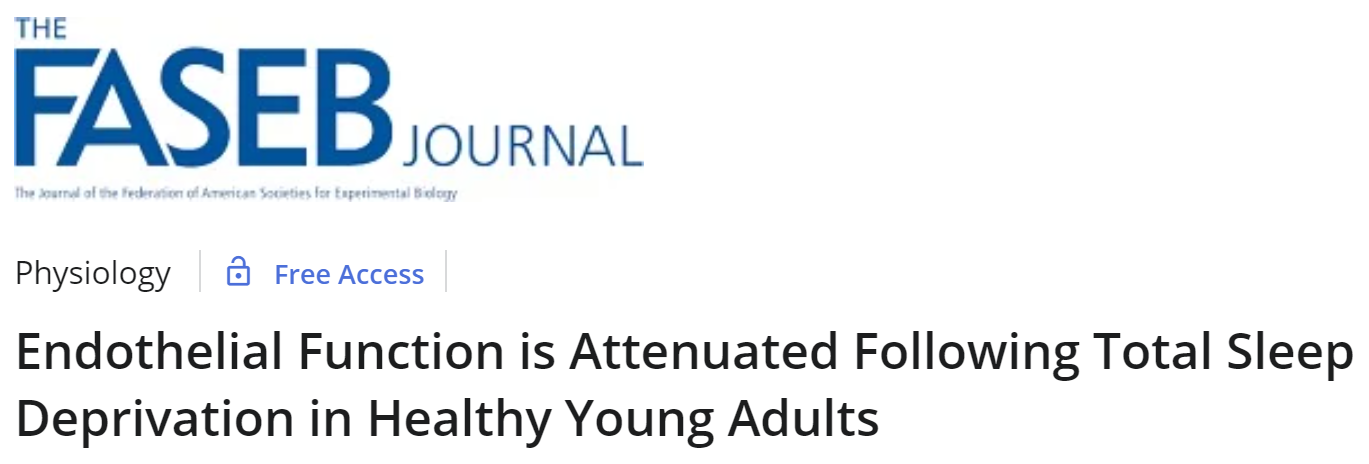Scientific Publications
Holmer et al. 2021
Sleep deprivation is highly prevalent and is associated with increased cardiovascular disease (CVD) morbidity and mortality. Our objective was to conduct a systematic literature review to evaluate the evidence on the effects of sleep deprivation on endothelial function (EF). Main findings include the following: (1) shorter sleep duration is associated with lower macrovascular EF; (2) not sleeping 7–9 h/night is linked with impaired microvascular EF; (3) sleep restriction impairs micro- and macrovascular EF; (4) acute total sleep deprivation impairs micro- and macrovascular EF but data on macrovascular EF are less consistent; and (5) shift work impairs macrovascular EF. In conclusion, sleep deprivation impairs EF, which may explain the link between insufficient sleep and CVD.
Holmer et al. 2019
The endogenous ketone bodies acetoacetate (AcAc) and β‐hydroxybutyrate (ß‐OHB) are produced by the liver and act as oxidative fuels and lipid precursors. Endogenous ketone production is stimulated to a greater extent during carbohydrate restriction (e.g. very low carbohydrate diets) or during caloric restriction (e.g. prolonged fasting). These dietary strategies generally induce some positive physiological adaptations such as weight loss, reduced oxidative stress and inflammation. However, ketogenic diets and fasting are not ideal for endurance exercise performance. Thus, there could be utility in using exogenous ketones in the absence of carbohydrate or caloric restriction to elucidate the specific role of β‐OHB on performance physiology and health.
Peveler W…Holmer B. et al. 2017
The use of energy drinks among athletes has risen greatly. Caffeine and taurine are the 2 primary performance enhancing ingredients found in energy drinks. The number of emergency department visits involving energy drinks doubled over the past 5 years. Reviews of the health complications have highlighted adverse cardiovascular events. The literature reveals that caffeine is known to moderately increase blood pressure (BP) and heart rate (HR). The purpose of this study was to determine the effect of 3 different energy drinks on cardiovascular and performance measures. The findings show no performance benefits under the conditions of this study. However, there does appear to be a significant increase in systolic BP.
Holmer et al. 2019
Insufficient sleep has been linked to an increased risk for cardiovascular disease, but the underlying mechanisms have not been fully elucidated. Endothelial function, an independent predictor of future cardiovascular events and mortality, may be detrimentally affected by sleep deprivation but this has not been tested. Purpose: We investigated the influence of total sleep deprivation (TSD) on endothelial function in healthy young men. Conclusions: Brachial artery endothelial function is attenuated following TSD in healthy young men. Strategies to mitigate the detrimental effects of sleep deprivation on endothelial function may be important for individuals who routinely undergo extended periods of sleep deprivation.
Hwang et al. 2019
Aging and diabetes are associated with decreased aerobic fitness, an independent predictor of mortality. Aerobic exercise is prescribed to improve aerobic fitness; however, middle-aged/older diabetic patients often suffer from mobility limitations which restrict walking. Non-weight-bearing/low-impact exercise is recommended but the optimal exercise prescription is uncertain. The goal of this randomized controlled trial was twofold: 1) to test if high-intensity interval training (HIIT) and moderate-intensity continuous training (MICT), implemented on a non-weight-bearing all-extremity ergometer, are feasible, well-tolerated and safe in middle-aged/older adults with type 2 diabetes; and 2) to test whether all-extremity HIIT is more effective in improving aerobic fitness than MICT.




